

How can new technology impact humanitarian action? From flying donkeys to Facebook, there are countless ways that emerging technologies are changing the face of development in the world’s poorest countries.
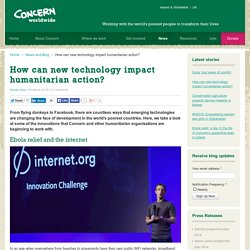
Here, we take a look at some of the innovations that Concern and other humanitarian organisations are beginning to work with. Ebola relief and the internet In an age when everywhere from beaches to graveyards have their own public WiFi networks, broadband internet is a service that we take for granted. For countries fighting the Ebola outbreak, however, connectivity has been a precious commodity. For health workers racing to save lives and limit contagion, every minute can make a difference. Enter Facebook. In 2013 CEO Mark Zuckerberg founded Internet.org, an initiative aimed at making internet access available to the two-thirds of the world population that does not yet have it. As part of Facebook’s response to Ebola, the social networking giant provided NetHope with broadband connections via its existing satellite network. 3D Printing. Open Data, Mobiles and Development. 28/04/2011 at 4:36 pm By Hans Zomer Ireland, like many other EU countries, has signed onto the IATI standards for aid transparency.
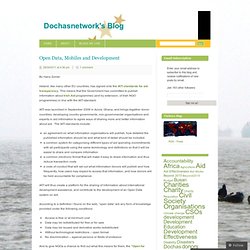
This means that the Government has committed to publish information about Irish Aid programmes (and by extension, of Irish NGO programmes) in line with the IATI standard. IATI was launched in September 2008 in Accra, Ghana, and brings together donor countries, developing country governments, non-governmental organisations and experts in aid information to agree ways of sharing more and better information about aid. The IATI standards include:
Www.tcd.ie/iiis/documents/discussion/pdfs/iiisdp279.pdf. 'Big Data' for development: What is it, and why you should care - Contributor: Anoush Tatevossian. The U.N.
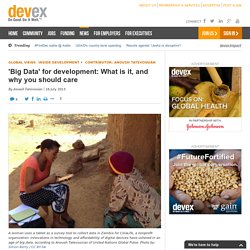
Beneficiaries-led development: can assistance be crowdsourced? The development agenda is being discussed more widely than ever.
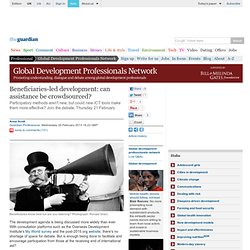
MDG eNAbler Briefing Kit Final. Using The Crowd To Save People After Disasters. Saving the world through social media? How development is going digital. Social media and mobile technologies offer a wide range of benefits for people working in development: a potentially cheap and efficient way to link citizens with their governments, the chance to monitor real-time progress on projects, and the ability to connect people from remote parts of the world to share experiences and teach best practice.
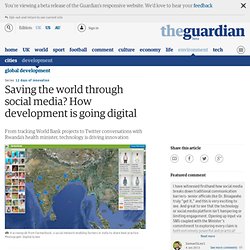
It is no surprise that there's an endless stream of development projects trying to tap into these technologies. In many cases it's still too early to tell what difference these efforts will make, but here are five that caught our eye. World Bank Finances app The World Bank spends billions of dollars on aid projects around the world, but where does this money go, and who wins bank-funded contracts? List of Apps for Development. Innovative Use of Cell Phone Technology for HIV/AIDS Behaviour Change Communications: Three Pilot Projects. The opportunities in South Africa for using mobile technologies to support initiatives in the HIV/AIDS sector are enormous. Mobile technology boosts water security for the poor.
LONDON (AlertNet) - Information technology is a powerful tool for experts working to provide secure access to water for personal use, food production and business in developing nations.
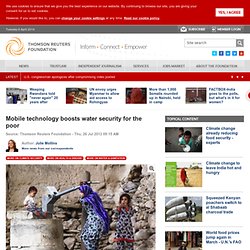
Giving poor people proper access to safe water and sanitation would save 2.5 million people a year from dying from diarrhoea and other diseases spread by a lack of hygiene, according to charity WaterAid. The widespread availability of mobile phones has enabled the development of low-cost solutions aimed at improving water security and reducing poverty. Three quarters of the world's 7 billion people have access to a mobile phone, according to a World Bank report.
There are 6 billion mobile subscriptions worldwide, of which almost 5 billion are in developing countries. 5 Reasons Mobile Is the Future of Sustainable Development. Social media and technology hold a unique position when it comes to shaping sustainable solutions for the future or our planet.
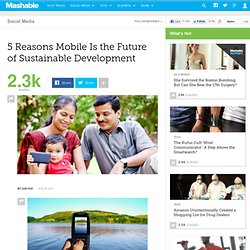
At the core of many of these possibilities for change are mobile phones. There are now 6.2 billion mobile phone subscriptions held by 4.2 billion mobile subscribers around the world — and that number is only increasing. By 2017, Ericsson forecasts 9 billion mobile subscriptions. As mobile continues its rapid run toward global adoption, more people will access the Internet solely through mobile devices. Mobile phones are even replacing paper money, helping to provide a check on authority and improving rural health standards. Cell phones are transforming Africa, but radio is still number one for the poor. Wthe use of cell phones is exploding across sub-Saharan Africa, even becoming a common tool for low-income farmers in some communities, radio remains the most influential source of information for the poorest people — in the cities as well as in rural areas:
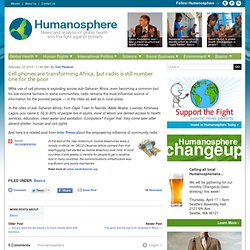
Telecoms boom leaves rural Africa behind. Internet Reinforces Inequality. Maps have always had a way of bluntly illustrating power.
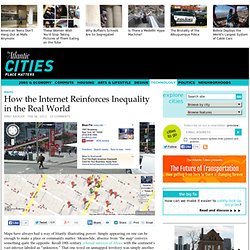
Simply appearing on one can be enough to make a place or community matter. Meanwhile, absence from "the map" conveys something quite the opposite. ICT for Development Network. UNDP and ICTs. 01 Nov 2011 Remarks for UNDP Administrator Helen Clark The London Conference on Cyberspace Session 1: “Hopes and Fears” 1 November 2011, London Foreign Secretary Right Honorable William Hague, Ministers, Distinguished Participants,
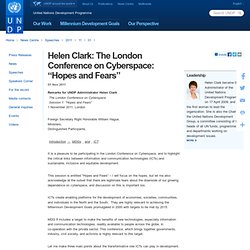
Development's last-mile logistics challenge. Ensuring humanitarian supplies and personnel reach the people they are intended to benefit, however remote and inaccessible their communities, is fundamental to any successful aid intervention. Yet, outside professional development circles, the logistical challenges involved in covering the so-called "last mile" receive scant attention.
Indigenous peoples and ICT.
ICTs and Urban Poverty.